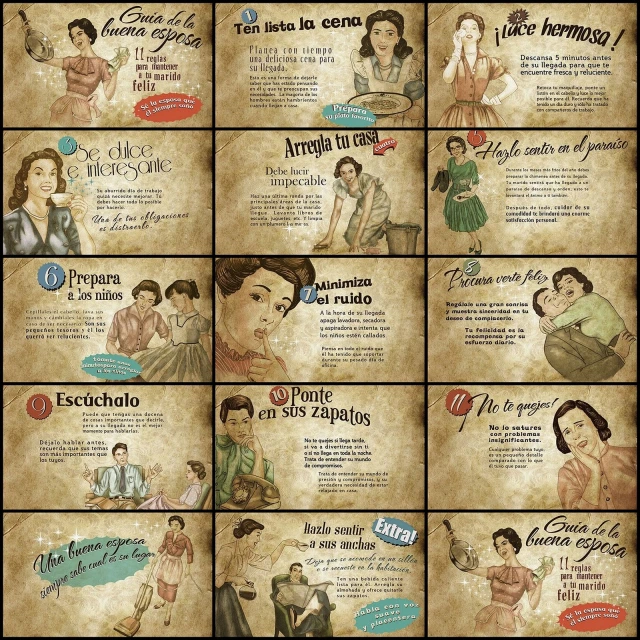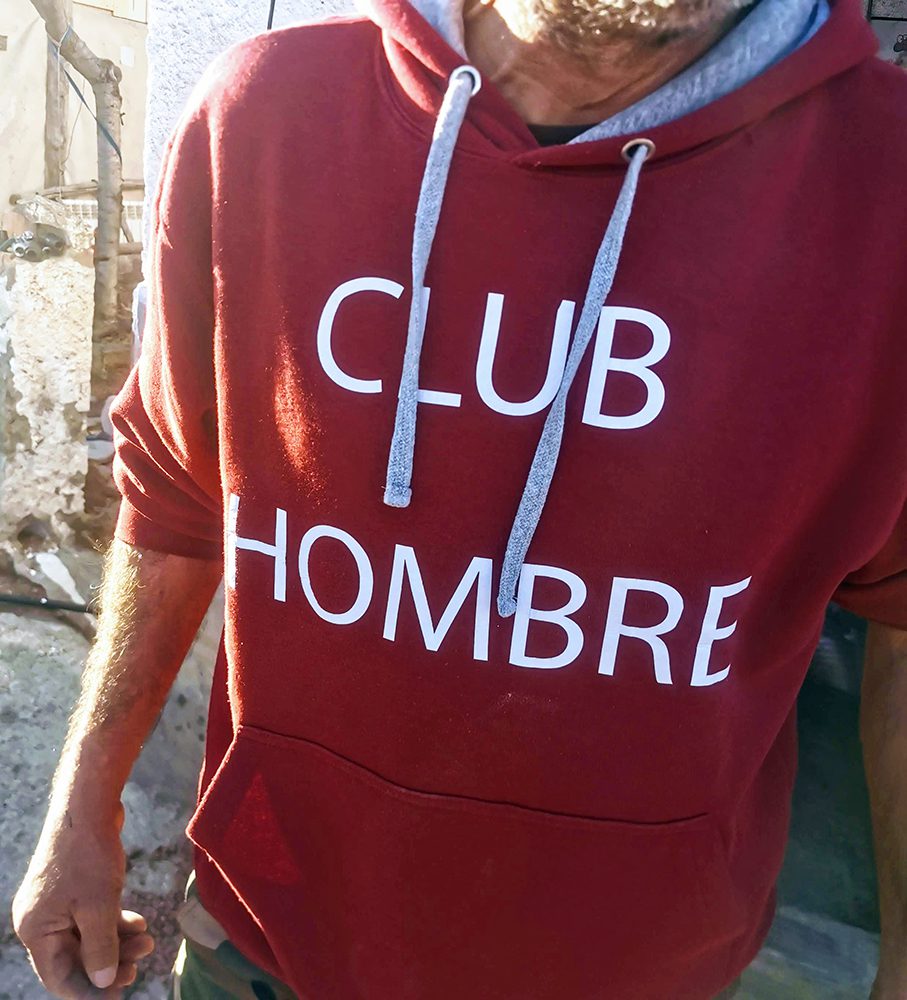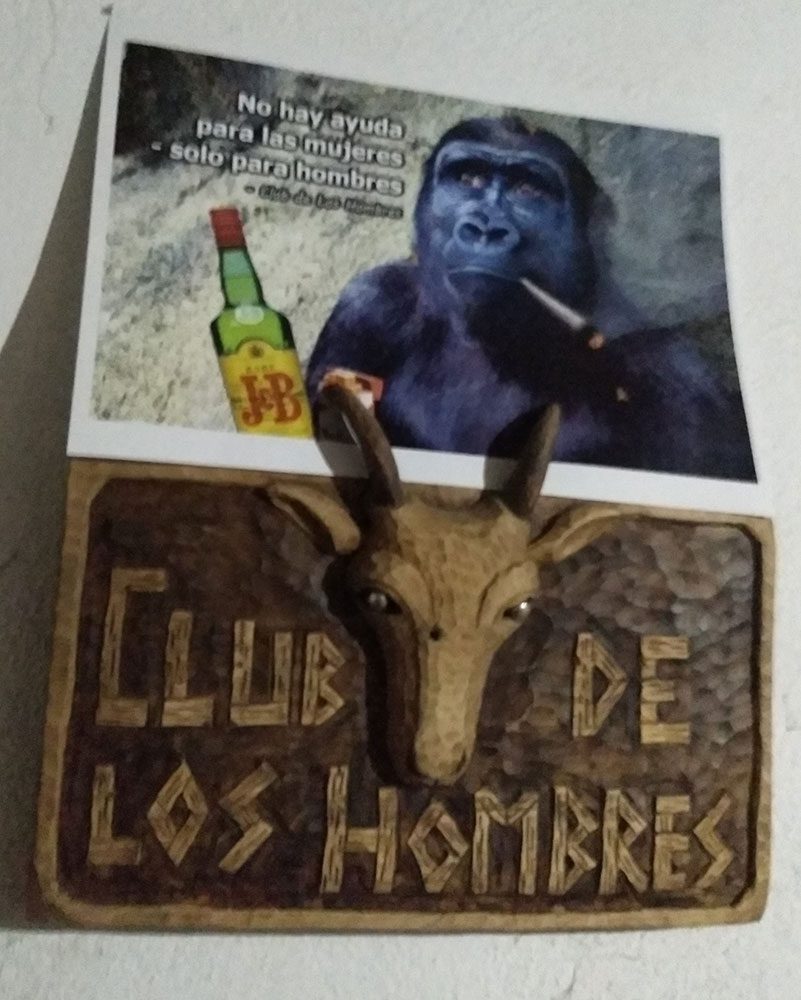Jo Chipchase draws on personal observation to explore gender roles in rural Spain...
WHEN British women move to rural Spain, they may (or not) have viewed Netflix’s hilarious series, ‘Alpha Males‘. Without giving too many spoilers, the series follows a group of typical Spanish men (in a city), who “deconstruct” themselves and their “toxic masculinity“. Then, in some cases, they decide to “reconstruct” it – sometimes with hilarious or unexpected results. In a country known for its ‘machismo’, the Spanish-made series is spot-on. But it’s fair to say that many female arrivals might remain unaware that the prevailing gender roles are rather different to those in Inglaterra.

To summarise, ladies (or ladettes!) expecting to escape grey skies, depressing drizzle, Tory politics, and austerity, might not expect to encounter a a parallel universe re dating and romance that is sometimes reminiscent of the 1950s!
Migrants (we dislike the word “expats”) who haven’t done their homework (or haven’t learnt Spanish yet!) might not consider gender roles before relocating. Yet, in a country that is predominantly Catholic, there are different social mores to – say – Brighton, London, or Leeds.
A change of scene and culture – are you a potential misfit in gender roles?
When moving to a new country (unless you’ve chosen a British ‘enclave’ or golf resort!), you’l probably start with good intentions to mingle without looking like the proverbial village idiot, regardless of gender roles. This might involve learning sufficient Spanish to avoid mangling your verbs or requesting a “polla” in the butcher’s shop. Most people don’t aspire to resemble the stereotypical Mad Brit abroad! Gambas! Drunks! Locos!
Admittedly, many ‘guiri’ women integrate easily into their local community and form healthy partnerships and marriages. Some even join traditional activities (for women), such as weaving, soap making, cleaning until you can eat off the floor tiles, and drinking Fanta and other “soda pop” at functions.. The situation is also straightforward for quiet ladies who stay at home with their pets. It’s even better if you move as part of a couple that is quite civilised.
However, this excludes a vast range of women. Singletons, Emos, mouthy types, liberals, feminists, tomboys, wannabe ‘alphas’, serial bigamists, loose cannons on the deck and… the other type of “easy integrator”, who isn’t viewed so kindly in a tiny village.
Underneath the bar terraces (especially those!) and olive groves, a more complex picture emerges — one that can surprise the unsuspecting ‘guiri’ woman who is accustomed to men changing nappies and babysitting while the girls go on bar crawls and hen nights. This is especially true if you hail from liberal cities with vibrant scenes celebrating people of all persuasions. In those locations, nobody will stare at you for sporting a latex bodysuit or tutu with fishnets underneath. Let’s face it – this isn’t the mode for your village bar with old men having a quiet beer after work. It might be the mode for the local carnival parade though! Or La Publica at San Juan in Lanjarón!
First, the good news re gender roles…
The positive. Spain has made a huge effort with public campaigns against violencia de género (gender-based violence). Most towns have posters, helplines, slogans, and faux roadsigns that say “stop violence”. Yet, in some villages, casual machismo still shapes everyday life.
In 2024, in Spain, there were 34,684 female victims of gender‐based violence (crimes committed by a current or former male partner), marking a 5.2% decrease from the 36,582 reported cases in 2023. (Source: INEINE)
This corresponds to a rate of 1.6 victims per 1,000 women aged 14 and over. It does seem that the message is getting through, backed by prison sentences for offenders. However, according to Cadena Sur, 40 % of all femicides (women killed by a current or former partner) occurred in municipalities with fewer than 20 000 inhabitants (Cadena SER.) Only 25 % of the rural victims had previously reported their abuser – versus a higher reporting rate in larger towns and cities. There is clearly a disparity in rural areas. Why? The culture is different (dare we say “behind”).

Old-time social mores
Have you ever watched the UK series, ‘League of Gentlemen‘, set in Royston Vasey? A local place for local people. A far cry from ‘Alpha Males’ , and not about gender roles specifically, but it has some relevance here. There can be a sudden realisation, after a few weeks (or days), that the tiny village you’ve inhabited has a gossipy vibe. And guess who is the gossip? Maybe you’ve put your foot in it from the start. OK, so that party until 5am wasn’t a good idea. Especially if you’re a single woman and invited the local men round. The reporter was once accused of having “a string of boyfriends entering the house” in a previous town – they were ALL workmen.
You’ll soon see a contradiction, based – largely – on historical reasons. These include the Franco era, the Catholic religion, and the patriarchy. Not that we are knocking anyone’s religion. It’s just that different doctrines have different ideas – including about “traditonal” gender roles. And the UK has become increasingly agnostic. Still, within many people’s memory, a Francoist era idea was that women were property of hubby, and the “good wife” should keep the house spotless, do all the childcare, and not bother him with idle “chit chat” when he returned from work. Shut up, do the cooking, clean the plates yourself. Some of these ideas have clearly stuck.

Real gender roles comments the reporter has received, in villages, over the years, include:
“Women should be at home with the mop (la fregona).”
“It is very ugly, women in the bar.”
“You are putting off the old ladies.” (In a bar.)
“Women do not raise their voices to men.”
“Why haven’t you cleaned those plates” (that weren’t even yours!)
“Make sure you behave because such-and-such’s wife is coming” (then nobody behaves, especially the men.)
“There’s nothing for you here.” (At a town barbeque for people of all nationalities.)
“La hembra….” (mare or other female animal.)
“Men of all ages were seen walking to the puti club before it closed down.”
“Franco was great because there were no drunks and everyone was in employment.”
Dating the family, not just the man
The cultural difference can become more pronounced – for some women – when they form a relationship with a Spanish man (or woman). You may think you’re dating an individual but, suddenly, you’re dating the entire family! And some traditional families (but not all – you can never generalise!l) have ideas of their own about ‘la novia’. These might include no short skirts, no drinking in public, don’t speak too loudly. One young girl, who became the ‘novia’ of a Spanish youth, was told by the parents: “You don’t wear shoes like that now you’re with him.” He later went on to commit domestic violence.
The cultural expectations re gender roles and ‘la novia’ can extend beyond fashion choices to behaviour and freedom. While they may be presented gently — possibly over the family dinner table — they can leave foreign women feeling scrutinised. As the ‘forastera’, it can be easy to feel “ganged up on” with the expectation you will behave a certain way.
There is also idea that the man goes out with his mates until silly-o-clock while ‘la novia’ cleans those plates after dinner, then goes to bed, waiting for a beast-like creature with beer breath to return… sometime. How nice.



Playing a role you didn’t anticipate
For a woman who doesn’t fit the expected mould — liberal, outspoken, party-loving — you can be swimming against the tide. Or just a scandal. Back in the Franco era, fiesty women were force-fed castor oil and then paraded, naked, through the village streets to humiliate them. It’s lucky that doesn’t happen now!
Remember that many women in rural villages frequently (and willingly) uphold the prevailing traditions – as firmly as the men. They are the designated drivers, the Fanta-drinkers, the child-carers, the matriarch, and the quiet enforcers of a system that gives men more social leeway than women. Foreign women who are a bit “wild” can attract more vitriol than local men who disappear into a poof of air with bottles of booze, saying they are “working”. However, they are their own secret society with their own rules (or lack of them). Or, if a man falls over drunk, it’s a bit like attending the circus for everyone else. No problema. Jolly-ho!
Once you’re in a committed relationship, the mould could become tighter (anecdotally). You may be expected to reflect the family and its values. A rural town will have many established families that command respect and “go way back” with authority figures, such as police, social workers, and the town councillors. Maybe they all went to school together. You surely aren’t in that club.
Some single mothers, especially those living off-grid in unconventional homes, have found themselves under scrutiny from social services. There have been (proven, verified) cases of fathers with existing restraining orders pertaining to one child being given access to a second child. The British mother will then try to pick up the pieces of the predicatable abuse. Meanwhile, fathers requesting custody rights, who belong to established families, might benefit from the old systems of enchufe — being “plugged in” — that don’t especially favour the ‘forastera’ (outsider). The plug is going to electrocute you!
Spanish TV promotes outmoded gender stereotypes
In a modernising country, the prevailing TV content doesn’t help reform gender stereotypes. Switch on a Spanish morning show and you’ll see adult women dressed as schoolgirls, pouting and pirouetting next to iffy male presenters twice their age. Channels such as BOM continue to broadcast Franco-era comedies from the 1970s, where plots centre on gross older men ogling bikini-clad women and trying to escape their wives for weekend “business trips.” Films like El Turismo es un Gran Invento (1970, Paco Martínez Soria) are prime examples. Those 1970s–80s comedies are collectively known as “cine de destape” (or “destape films”). Under Franco’s tight censorship, they were some of the first movies allowed to show nudity and risqué humour. By the late 1970s, they proliferated on channels like BOM (the scraping of the barrel) and, today, are cheap to license. These B movies are played for laughs, but the repeated themes — leering, groping, and objectifying women — feel out of step with modern Spain. Some old-timers love them though…. and the rubbish westerns with flimsy sets. And bulls.



Between progress and patriarchy
Spain has made a concerted effort to tackle gender equality. It was unfortunate that the 2024 Solo Sí es Sí law — intended to strengthen sexual consent laws — backfired when a loophole reduced the sentences of some sex offenders, including the infamous Wolf Pack. This caused public uproar and a government reshuffle. Meanwhile. domestic violence laws are tough: prison sentences for serious offences can range from several years to over a decade, and verbal abuse is increasingly prosecuted. However, legal reform doesn’t always trickle down to bars, fiestas, or private homes. Many women might avoid reporting abuse for fear of “what people will think”.
Furthermore, in some areas, a Francoist nostalgia lingers barely under the surface — and not just amongst the elderly. The reporter once spotted a sticker supporting Franco in a bar window..
Then we have far-right party, Vox. Its approach to women’s issues is based on a conservative, anti-feminist agenda. The party rejects “gender ideology” and has pledged to repeal Spain’s 2004 Gender Violence Law, arguing that it unfairly targets men. Instead, Vox proposes a “Family Violence Law” that would extend equal protection to all victims, regardless of gender, including children and the elderly. Vox also opposes abortion rights, rejects the legalisation of euthanasia, and champions traditional family structures. In a February 2025 poll by 40dB for El País and Cadena SER, Vox’s voting intention rose to 14.2% – up nearly two points from 12.4% in the July 2023 general election. It is the third-largest party in the national parliament, with 33 seats. It is gaining traction by defending “natural family values” against progressive gender policies.
Is significant change coming re gender roles
Are thing changing? Perhaps. Younger women are more visible in protests, parties, in every part of life.. However, a worrying theme is that younger men are not immune to the toxic influences of global figures like Andrew Tate, the incel community, the “manosphere” (this is more than a tad women-hating), and local role models who reinforce old norms. They might not want to force castor oil into “mouthy” women, but those sentiments haven’t entirely vanished. Youth have been heard, in rural villages, muttering about “high value women”, “women can’t drive or work as firewomen”, and extolling the ideas of toxic influencers. This isn’t their fault – it is pushed at them by social media. Some feel they have been marginalised re the focus on the rights of other demographics.
This isn’t an attack on Spanish culture — far from it. Most of us live here because we love it. But loving something doesn’t mean ignoring its contradictions. Perhaps the challenge is to find compromise. It pays to respect the culture of the host country. And we can talk to the youth about why they feel disenfranchised and turn to influencers as father figures, in the lack of real ones. And why women aren’t just for the kitchen sink and looking after kids!
